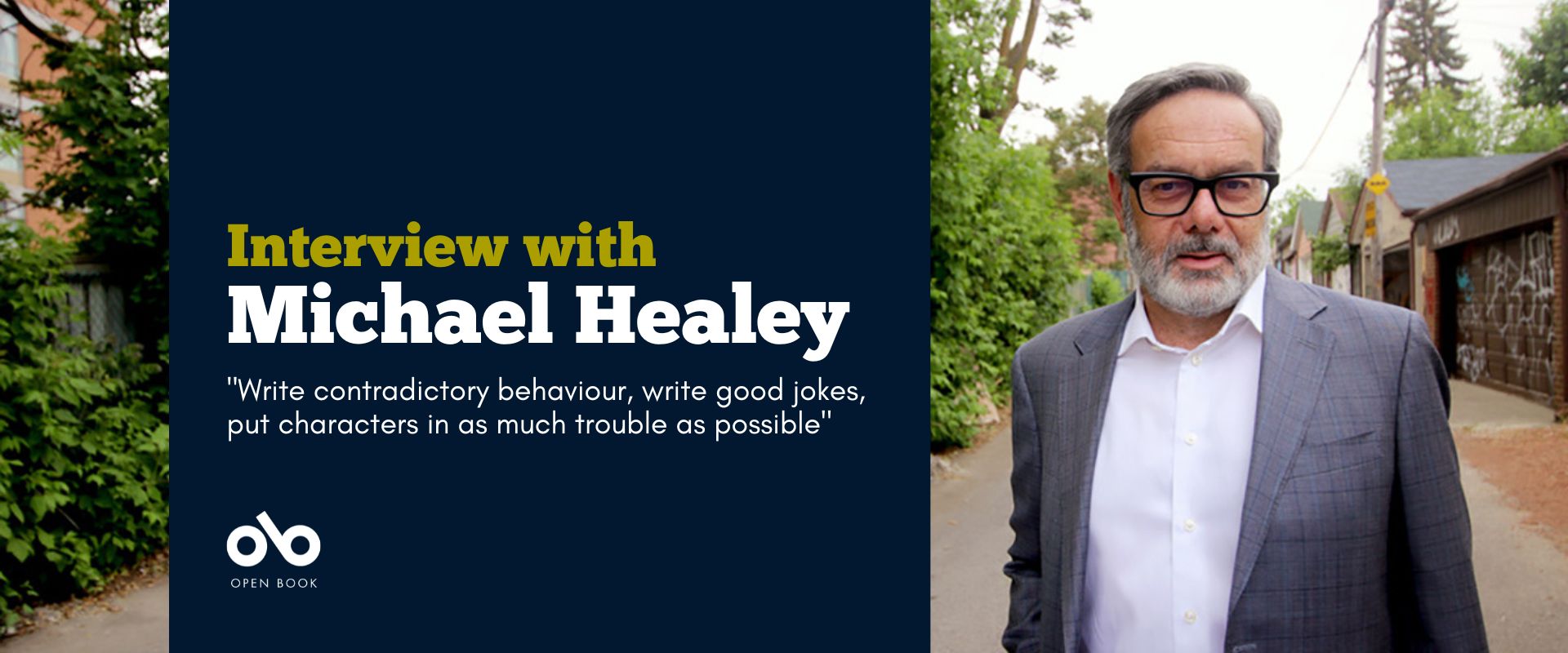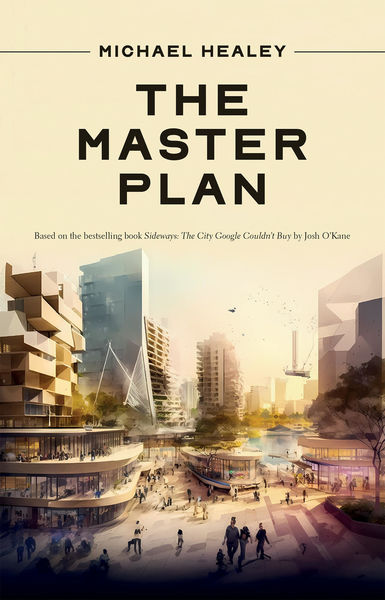Michael Healey on Exploring Toronto's Quashed "Smart City" Google Collaboration in His Hilarious New Play
The year was 2017 and Toronto was poised on the precipice of one of the biggest municipal partnerships in history – a project to create a "smart city", coordinated between Waterfront Toronto and Google's innovative Sidewalk Labs. It seemed almost too good to be true – and it soon proved to be, as the deal, which had attracted intense international attention, abruptly and spectacularly fell apart in the face of privacy concerns, public pushback, and corporate ineptitude.
This local implosion serves as delicious fodder for iconic Canadian playwright Michael Healey's work The Master Plan (Playwrights Canada Press). Darkly hilarious and uniquely Canadian, no one is safe in Healey's play as he lovingly skewers politicians, corporate leaders, and public personalities.
Drawing on the bestselling exposé of the process, Sideways: The City Google Couldn't Buy by Josh O’Kane, The Master Plan pokes thoughtful fun at corporate greed, bumbling government, and the problematic aspects (including elements of class, exclusion, and NIMBYism) involved in public consultation.
An icon of Canadian theatre, Healey has been an acclaimed playwright for decades. His first full-length play, The Drawer Boy, premiered in 1999 and continues to be produced internationally to this day. He is a five-time winner of the Dora Mavor Moore Award for best new play and has written and adapted works for the Stratford Festival, the Shaw Festival, and Soulpepper.
We're excited to welcome him today to talk about The Master Plan. He tells us about his admiration for many of the people involved on the Toronto side of the plan despite his comic take on the matter, relates how quickly he was attracted to the story and how "the complexities of intent, relationships, and technology could form the engine for a play", and shares four pithy pieces of excellent advice for creating strong characters in theatre and beyond.
Open Book:
How did this play first come to life for you? Do you remember the first bit of writing you did for it?
Michael Healey:
The Master Plan is based on Josh O’Kane’s Sideways: The City Google Couldn’t Buy. The book contains his reporting about the partnership between the Google company Sidewalk Labs and Waterfront Toronto as they attempt to build a radically affordable and sustainable neighbourhood on the Toronto waterfront. Reading Josh’s book, I was immediately captured by the contrast between the American tech entrepreneurs and Canadian bureaucrats. I knew there was comedy available, and also the possibility to look at how Canadian political systems and systems of power resist change.
OB:
Was there a question you were exploring in this work, and if so, did you know what it was when you started writing?
MH:
I had a casual, newspaper reader’s understanding of the project (called Quayside) as it was happening, and like a lot of Torontonians, felt the project’s failure was probably a good idea — that the costs in terms of data harvesting and exploitation were too high. Josh’s book described in detail what was being attempted at Quayside, its worthy goals and misguided aspects too. It took me inside the dynamics of a public/private partnership, where one partner wants to act in the public interest and the other is looking to maximize profits. In the end, I came to admire many of the people involved, especially on the Waterfront Toronto side. It’s profoundly difficult for a public agency to attempt any kind of innovation.
Sidewalk Labs, this Google offshoot, was a lousy partner from the outset — far too concerned with impressing its parent and making money. Waterfront Toronto wanted to take radical steps in terms of housing that was as affordable and as carbon-neutral as possible. I’ve come to the conclusion that while people were right to be skeptical about Sidewalk Labs, Waterfront Toronto’s vision was laudable. It was also doomed to failure by intractable politics, an ocean of bad press, and Toronto’s most prominent trait, NIMBYism.
Your CanLit News
Subscribe to Open Book’s newsletter to get local book events, literary content, writing tips, and more in your inbox
OB:
What was the most surprising or memorable moment or experience you had while writing this play?
MH:
It arrived early on. I don't know why, but as I was reading Josh’s book I could see at once how it could translate into an event of theatre. I had an almost immediate understanding of how the complexities of intent, relationships, and technology could form the engine for a play. I’m rarely certain about anything anymore, but this I got instantly.
I also knew early on how far from the reporting I would have to move to make the points I wanted to make. The blend of facts and fictionalization has been fun.
OB:
Which of your characters do you feel most connected to in this work, and why?
MH:
Fictionalized versions of two Waterfront Toronto managers: Kristina Verner and Meg Davis. Long-serving stewards of the slow, careful development of Toronto’s waterfront. They had the chance, because their agency actually owned the Quayside site, to develop a neighbourhood that incorporates the best current thinking on carbon-neutral living. They’re immediately undermined by the large, loud personalities at Sidewalk Labs, and also by a growing tide of negativity about the project from Toronto. In the end, they were abandoned and vilified by three levels of government, Canada’s tech sector, the press, everyone. Here were well-intentioned public servants, acting thoughtfully and carefully to admirable ends, and for their trouble they got a royal shitkicking.
OB:
In your opinion, how does one go about writing great and memorable characters for the stage?
MH:
Give actors fun, hard things to do: write contradictory behaviour, write good jokes, put characters in as much trouble as possible. The more meat you give actors, the more memorable the characters.
_________________________________________________________
Michael Healey trained as an actor at Toronto’s Ryerson Theatre School in the mid-eighties. He began writing for the stage in the early nineties and his first play, a solo one-act called Kicked, was produced at the Fringe of Toronto Festival in 1996. He subsequently toured the play across Canada and internationally, winning the Dora Mavor Moore Award for best new play. The Drawer Boy, his first full-length play, premiered in Toronto in 1999, winning the Dora Award for best new play, the Chalmers Canadian Playwriting Award, and the Governor General’s Literary Award (Canada’s highest literary honour). It has been translated into multiple languages and continues to be produced regularly across North America and internationally. Healey’s other works include The Road to Hell (co-authored with Kate Lynch), Plan B, Rune Arlidge, The Innocent Eye Test, The Nuttalls, Are You Okay, and 1979. His trilogy focusing on Canadian values and politics—Generous, Courageous, and Proud—met with great critical success and have had multiple productions. In all, his plays have won the Dora Mavor Moore Award for best new play five times. He has also adapted works by Chekhov, Molnar, Hecht, and MacArthur, Dürrenmatt, and Shaw for the Stratford Festival, the Shaw Festival, and Soulpepper. He continues to find work as an actor occasionally.



